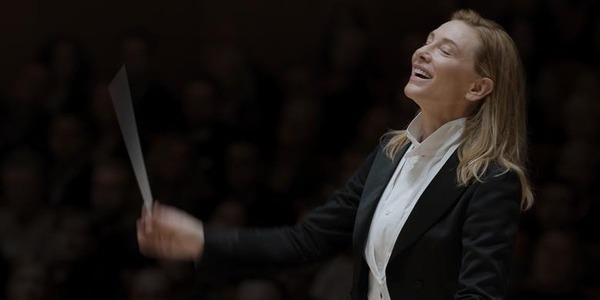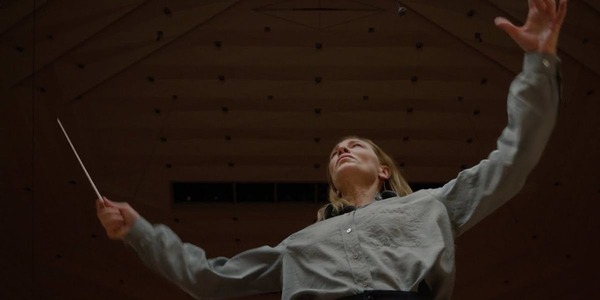Venice International Film Festival 2022: TÁR

Wilson is a cinema enthusiast based out of Toronto, Canada.…
Coming out of Tár, it’s hard not to muse over whether any other performer this year can top what Cate Blanchett does in these 158 minutes of pure thespian magic. The short answer is likely to be an emphatic no. Todd Field’s return to cinema is an astoundingly complex character study bound within a highly relevant social context, and Blanchett helps ice this narrative experience with a flawless performance. I’m well aware that awards season is only beginning, but any other best actress contender certainly has an uphill battle ahead of them this year.
Lydia Tár (Blanchett) is one of the world’s most renowned conductors, and the film starts off by clarifying her disdain for those who associate her success with her gender. And although she’s never portrayed as being opposed to helping other female artists, as far as she’s concerned, women in general are no longer at a disadvantage when compared to their male counterparts. This somewhat provocative worldview becomes clearer as the film progresses. Whether it’s her interactions with her assistant, Francesca (Noémie Merlant) — an aspiring conductor herself — or her partner (Nina Hoss) or colleagues from work (Mark Strong, Julian Glover), Tár begins painting herself as a much more malevolent presence, despite her talents and successes.
Separating The Art From The Artist
At the core of what Tár is about — and let’s be clear, the film is about so many different things — sits a compelling dissection of whether and how we separate one’s art from the artists themselves. This age-old concept has rightfully had renewed scrutiny in the wake of the #MeToo movement, and Tár makes the bold choice of having the accused abuser be female. Doing so allows an almost refreshed viewpoint of the complexities of systemic abuse and power dynamics in the workplace. Field makes a conscious decision to really showcase how illustrious Tár is as an artist, to the point that the first hour of the film is reflective of how the story’s fictional world has tended to embrace her talents. And as her more cruel intentions come to light, the unexpected gender dynamics in the film add nuance to the grander statements that come from its narrative.

One of the simplest and most profound statements Tár makes is in relation to whether one can or should separate the art from the artist themselves. This is complicated by the fact that an artist might not always be doing their work for the sake of the art itself, with one’s thirst for power and greed being a relevant through line as well.
The film poses more questions than it answers, and any forgone conclusions that one generates likely stem from the viewer’s moral tendencies rather than those of the filmmakers. Field is careful never to paint anything in purely black and white terms, even when the answer might seem obvioius. This is even reflected in the film’s grey-ish color tones, which imbue the mise-en-scène with embellished uncertainty and intensity. And as Tár’s mental state becomes more tenuous through the film’s psychologically thrilling turns, the price of genius is unveiled in a creatively fulfilling manner.
Casting A Genius To Play A Genius
On the subject of creative geniuses at the top of their art forms, much like the character, she’s portraying, Blanchett has for some time now been at the top of her game. And this mirroring of mastery in one’s craft is fitting given Blanchett’s performance. Her sheer intensity and embodiment of flawed perfection is without any blemishes, and it’s hard not to be mesmerized by the way she carries herself from scene to scene.

By the end of the film, Tár as a character isn’t meant to be someone you necessarily root for. But with Blanchett’s incredulous performance, the character itself never becomes a hated one, despite her many questionable decisions. This mixed dichotomy of feelings is instrumental to the film’s complex ideologies and would be no easy feat for any performer. It’s not surprising that someone of Blanchett’s calibre would be able to give a performance like this, but it’s still hard not to be awe-inspired.
Conclusion
Tár is a prime example of emotionally varied and exhilarating dramatic filmmaking at its finest. Field hasn’t made a film in 16 years (since Little Children in 2006), and his return to directing is simply a tour de force. He’s crafted something that seems to transcend its socially complex thesis, and he provides more food for thought than one could possibly hope for in a film. Of course, this is in large part due to Blanchett’s godlike performance in what will certainly go down as one of her most revered roles as an actress.
What did you think of Tár, and are you excited to see the film? Comment below and let us know.
Tár will release theatrically on October 7, 2022.
Watch Tár
Does content like this matter to you?
Become a Member and support film journalism. Unlock access to all of Film Inquiry`s great articles. Join a community of like-minded readers who are passionate about cinema - get access to our private members Network, give back to independent filmmakers, and more.
Wilson is a cinema enthusiast based out of Toronto, Canada. He escapes from his day job by writing random thoughts about cinema on the internet. Although he has a longstanding penchant for Hong Kong cinema, he considers himself to be an advocate for Asian cinema in general. He has been attending the Toronto International Film Festival every year since 2005, and more of his work can be found on his website: www.wilson-kwong.com.













